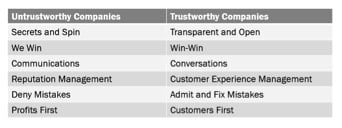Earning customer trust is a business imperative
It’s pretty much settled science that consistently great customer experiences drive greater customer loyalty. It’s why customer experience leaders across a wide range of industries enjoy a double-digit “loyalty advantage” over laggards, with their customers more likely to spend more and recommend them, and less likely to give their business to others.
The other main factor in loyalty is unsurprising, and as logical as it is emotional – and that’s trust. In fact, one 2010 study on the subject shows that trust drives between 22 and 44 percent of customer loyalty.That customer experience, trust and loyalty are so tightly linked means that earning customer trust is imperative for any company that wishes to better engage with their customers.
Customer trust continues to fall - across the board, and around the globe.
Unsurprisingly, when it comes to trusting the companies that wish to serve us, we’re not too quick to do so. And we’re even less likely to trust in 2015 than in 2014 - results from the most recent annual Edelman Trust Barometer survey show that trust has fallen across the board, and around the globe.
I (unscientifically) think that we customers believe that most companies fall into one of three categories:
- The good guys who are actually trying to earn our trust, and back this up with the service, practices and policies that show they deserve it.
- Companies that would like us to trust them, but aren’t that successful at doing so. They may mean well, but can’t consistently deliver on it.
- Those that don’t deserve or try to earn our trust but consistently exhibit by the way they treat their customers – everything from bait-and-switch to horrible service – that they’re just not worthy.
This isn’t really a problem for consumers. After all, we’re more able and willing than ever to switch if we feel a company isn’t looking out for our best interests.
But for companies and those who lead them, this is a big deal indeed. If your company falls into the last bucket? Frankly, I’d suggest you look for a new job. And if your firm falls into either of the first two, the path forward is clear: make (or continue to make) it a priority to earn your customers trust, and to be deserving of it.
What does “earning customer trust” mean to company leaders?
Customer trust is based on the experiences they have, the opinion of friends and family and the opinions of countless others through social networks (where we customers have the tools and the inclination to share recommendations or warnings at the slightest provocation).
This means that for a company to earn customer trust, leaders need to ensure the company, its people and its practices are, in fact, trustworthy.

There are many ways you can re-focus to be more trustworthy. Here, we’ve created a list of six areas where we’ve seen a high correlation between customer loyalty, experience and trust. While it is neither exhaustive nor prescriptive, you can’t go wrong with any.
- No secrets, no spin. Keeping secrets is instinctive for execs of a certain age. Today? Transparency rules. The “truth” is coming, and there’s nothing you can do about it. Better to embrace it now, rather than be embarrassed (or out of business) later.
- Win-Win vs. We Win. The most successful companies are winning big in the market (valuations, profits, market share, etc.) because they have a “win-win” mentality. They put customers and employees first, and everyone – including shareholders – wins.
- Talk, don’t tell. For decades, companies have told their customers what they need to do. Moving forward, those that actually listen to their customers – and act on what they learn – will be closer to their customers than any competitor, and will reap the rewards.
- Customer experience management. By aligning your business to your customers and their needs, your reputation will take care of itself. Customers know when you care about them, and put their needs first. And they’ll reward you, and tell others.
- Own your mistakes. It’s amazing how many companies first reaction to bad press or a negative customer review is to deny there’s a problem (Takata air bags? GM ignition switch defects?). Trustworthy companies admit it, fix it, and move on.
- Put customers ahead of profits. I’m not suggesting you don’t focus on making money. I’m suggesting that if you make decisions about your customers based on what’s best for them, profits will certainly follow. It’s that “win-win” vs. “we win” mentality.
For some companies – including many of the most successful – thinking like this isn’t a huge leap. For these companies, transparently displaying, discussing and resolving everything; including the good, the bad and the ugly; is simply the way business is run.
For others, the concept of having to “earn” trust radically shifts the balance of power between their companies and customers. For these, it will force them be more open and honest, even when they would prefer not to be.
For all of us – as executives and advisors as well as our roles as business and consumer buyers – we recognize that integrity leads to engagement, and both to trust. Me? I wouldn’t want it any other way.

